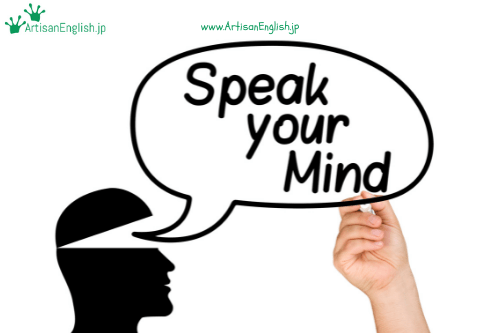
YouTube / iTunes / Spotify / Radio Public / Pocket Casts / Google Podcasts / Breaker / Overcast
Listen to ArtisanEnglish.jp posts & lesson intros here.
Phrase: Speak your mind
Learning a language changes you.
You will be able to switch back and forth from one culture to another.
If you are Japanese, you will be able to speak your mind in English and follow the crowd in Japan.
If you can speak your mind, you are able to say what you think, even if that means disagreeing with someone else or upsetting them.
The culture of English-speaking nations places value on being able to speak your mind.
You need to be able to say what you think, even if that means disagreeing with someone else.
It even implies that, at times, two people will have to agree to disagree.
Japanese like to come to a consensus.
That’s why it often requires such a long time to come to a decision.
A final agreement will not be concluded until everyone is on board.
When I worked for an online language school, we had classes that required debate between students.
I noticed that some students always gave in to the other side no matter what the topic for discussion was.
Even when they switched perspectives and argued for the opposite opinion, they still capitulated.
You see, they were able to speak their minds but were unable to stick to their guns.
There was an internal conflict between their Japanese selves and their English-speaking selves.
Their Japaneseness demanded consensus, whereas their English alter ego required them to speak their minds.
The idea that it was possible to have a great debate with no clear winner was a foreign concept.
That’s why they were still ‘learning’ English.
As of then, they had not mastered the concept that debate for the sake of debate was enjoyable and an outcome in itself.
As an English speaker myself, I love a great discussion, but that doesn’t mean I’m going to change my mind.
It just means I will speak my mind and have fun doing it.
Flesch-Kincaid Readability Test
This post is understandable by someone with at least a 7th-grade education (age 12).
On the Flesch-Kincaid reading-ease test, this post scores 74.
The easier a passage is to read, the higher the score on a scale of 0 – 100.

